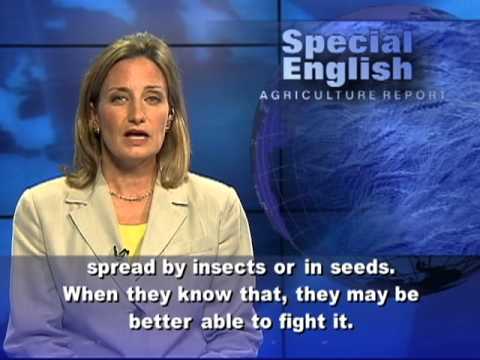This is the VOA Special English Agriculture Report, fromhttp://voaspecialenglish.com | http://facebook.com/voalearningenglish
Officials in Kenya are fighting a deadly disease attacking maize crops. Some Kenyan farmers say the disease has reduced crop production by as much as 60 percent. Last September, farmers in Bomet reported that a disease was destroying their maize or corn. The disease is called "maize lethal necrosis." It makes the plant turn yellow and dry up. By January, researchers found the disease was spreading across the country's south and into central and eastern Kenya.Paul Omanga is a crop production officer with the United Nations' Food and Agriculture Organization. He says a study in July found that maize lethal necrosis had affected more than 64,000 hectares. Up to 80 of the crop was ruined. The FAO official warned that if the disease is not controlled, it would have a major effect on maize production in Kenya.Muo Kasina is a researcher with the Kenya Agricultural Research Institute. He is working with others to fight the disease. But he says there is no known way to treat it.Muo Kasina says the problem is that Kenyans do not have any experience with the disease. He says he has no idea of what to expect in the future. Researchers are investigating whether maize lethal necrosis is spread by insects or in seeds. When they know that, they may be better able to fight it.There are some things farmers can do. The FAO's Paul Omanga says he and others are telling farmers about the importance of crop rotation. That means planting different crops on the same field from year to year. But he says farmers must take more extreme action if they suspect the disease has infected their crops.Paul Omanga is calling on farmers to destroy all maize plants in fields that are infected. He says farmers can burn the plants or use them as animal feed. He says stems and leaves are all fit for livestock. But he warns that infected plants should not be left in the field because the virus will remain to infect the next crop. Paul Omanga says he is concerned about Kenya's food stability. "This is causing some concern," he says, "because maize is the staple food and any threat to maize production is a threat to food security in Kenya." America's Agency for International Development says the poorest Kenyans spend 28 percent of what they earn on maize. For VOA Learning English, I'm Laurel Bowman. (Adapted from a radio program broadcast 28Aug2012)

원문출처 : http://www.youtube.com/watch?v=gbwtVNu3XwA&feature=youtube_gdata





 English
English 한국어
한국어
